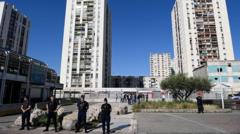As Italy's Giorgia Meloni and France's Emmanuel Macron prepare for a meeting in Rome, the contrasting political identities and historical tensions between the two leaders are highlighted. Both politicians aim to collaborate on pressing global issues despite previous public conflicts.
Italy and France's Leaders Meet Amidst Political Tensions

Italy and France's Leaders Meet Amidst Political Tensions
Giorgia Meloni and Emmanuel Macron put aside differences in search of unity in a challenging international landscape.
The political landscape in Europe continues to be dominated by complexity, and the dynamic between Meloni and Macron is emblematic of such tensions. Known for their vastly different political roots—Meloni hailing from the nationalist right and Macron embodying a liberal internationalist stance—their cooperation comes at a crucial time. The upcoming bilateral meeting represents Macron's first official visit focused solely on Meloni since she assumed the premiership in 2022.
The backdrop of their meeting includes urgent global challenges, such as the ongoing conflict in Ukraine and economic relations with the United States. Experts, like Jean-Pierre Darnis from the Université Côte d’Azur, emphasize that external pressures have compelled these leaders to overcome their politically charged histories in favor of collaboration.
However, the significance of this meeting remains to be seen. Observers point out that Meloni's identity as a populist outsider directly opposes Macron's elite-centric political approach, potentially complicating dialogue. As Claudio Cerasa, editor of Il Foglio, notes, these leaders may “misunderstand each other,” underscoring the potential hurdles ahead in achieving mutual understanding.
In a Europe facing multiple crises, the relationship between Meloni and Macron will be closely scrutinized as they navigate their political differences in pursuit of stability and progress.
The backdrop of their meeting includes urgent global challenges, such as the ongoing conflict in Ukraine and economic relations with the United States. Experts, like Jean-Pierre Darnis from the Université Côte d’Azur, emphasize that external pressures have compelled these leaders to overcome their politically charged histories in favor of collaboration.
However, the significance of this meeting remains to be seen. Observers point out that Meloni's identity as a populist outsider directly opposes Macron's elite-centric political approach, potentially complicating dialogue. As Claudio Cerasa, editor of Il Foglio, notes, these leaders may “misunderstand each other,” underscoring the potential hurdles ahead in achieving mutual understanding.
In a Europe facing multiple crises, the relationship between Meloni and Macron will be closely scrutinized as they navigate their political differences in pursuit of stability and progress.




















